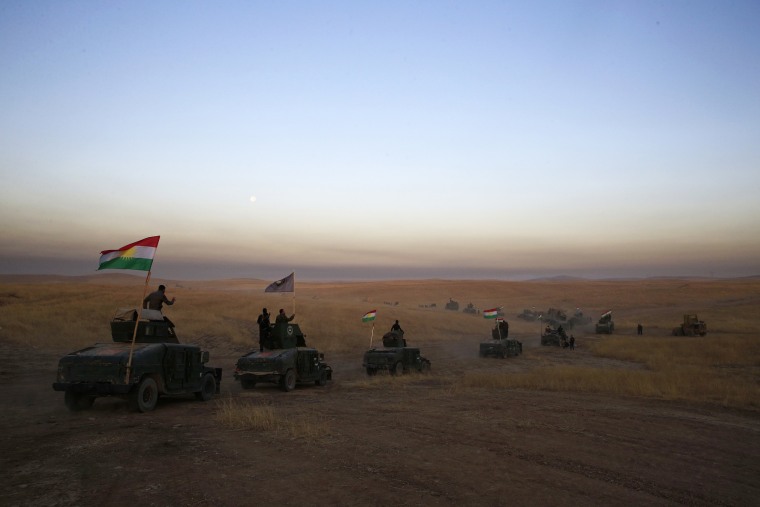The military campaign to push ISIS out of its stronghold in Mosul may come at a high price: many hundreds of battle-tested and heavily armed fighters who could flee to Europe to launch terrorist attacks against U.S. and allied interests, officials tell NBC News.
U.S. officials have long feared that this is a natural and expected result of the long-planned military operation against thousands of ISIS fighters operating out of Iraq’s second-largest city, some of whom have already used chemical weapons.
“It's a quite legitimate concern,” Seamus Hughes, a former U.S. National Counterterrorism Center official, told NBC News.
“We've seen in past conflicts, in places such as Bosnia or Afghanistan, that foreign fighters return to their home countries and use the skills and connections they acquired to plan future attacks,” said Hughes, who is now deputy director of the Program on Extremism at George Washington University. “Some undoubtedly will move on with their lives but there is, of course, a rate of recidivism and true believers that will continue on the fight. So while the short-term gains of the fall of Mosul are important, we can't lose sight of the long-term implications when they disperse.”
Hughes said that the U.S. has gotten better at preventing such foreign fighters from returning to American soil from ISIS-controlled areas in Iraq and Syria, including some who first went to Europe. “But we’ve seen examples of Americans coming back and planning attacks,” he said.
One reason U.S. officials are so concerned: About one-fifth of ISIS’s total number of fighters, or 3,700 people, are residents or nationals of Western Europe, including 1,200 from France alone, according to a study last year by King’s College London. At least 4,000 to 8,000 ISIS fighters have been embedded in Mosul, although it is not known how many of them are from Europe. A much smaller number are believed to have had some connection to the United States, according to Hughes and other experts.
U.S. officials believe many of the fighters will just shelter in place, ride out the invasion and try to ignite an insurgency by reclaiming pockets of Mosul.
But some have fled Mosul already, and many others are expected to as the battle moves to the streets. After heading to Tal Afar and other way stations in Iraq, most will follow well-trod transit routes. And many of those lead directly into Europe, where ISIS affiliates have launched deadly attacks in cities like Paris and Brussels.
The top Coalition general in Iraq, U.S. Army Maj. Gen. Gary J. Volesky, told NBC that he is concerned ISIS will launch terror attacks on targets in the West in retaliation for the invasion –- and possibly even as a diversion to its loss of yet another major stronghold.
"That's what we're worried about, from my perspective back at home is when Mosul falls, how are they going to try and deflect the attention?" Volesky said in an interview with NBC’s Richard Engel.
Volesky said the U.S.-led coalition is watching for signs of ISIS fighters deploying elsewhere. “The international community, we haven't just been sitting around or watching,” he said. “If there are indications, we'll address them.”
The European Union’s security commissioner, Julian King, recently warned that violent extremists who left Europe to join ISIS are now fleeing the U.S.-backed offensive.
Even a handful would pose “a serious threat we must prepare for,” he told German newspaper Die Welt on Tuesday.
Defense Secretary Carter Ash Carter will meet with his French counterpart in Paris next week to discuss strategy on how to counter ISIS’s external operations in the coming months, according to a senior defense official. The Pentagon wants to plan with European allies on how to prevent ISIS from launching terrorist attacks in Europe. General Raymond Thomas, who heads the US Special Operations Command, which tracks and kills suspected terrorists across the globe, will also attend the Paris meetings, according to the official, who requested anonymity to discuss planning meetings.
Last month, FBI Director James Comey told Congress that the number of Americans traveling to Syria to fight alongside ISIS has slowed to a trickle over the past year. But as ISIS is “crushed” by a coalition military effort, "There will be a terrorist diaspora sometime in the next two to five years like we've never seen before," Comey said.

